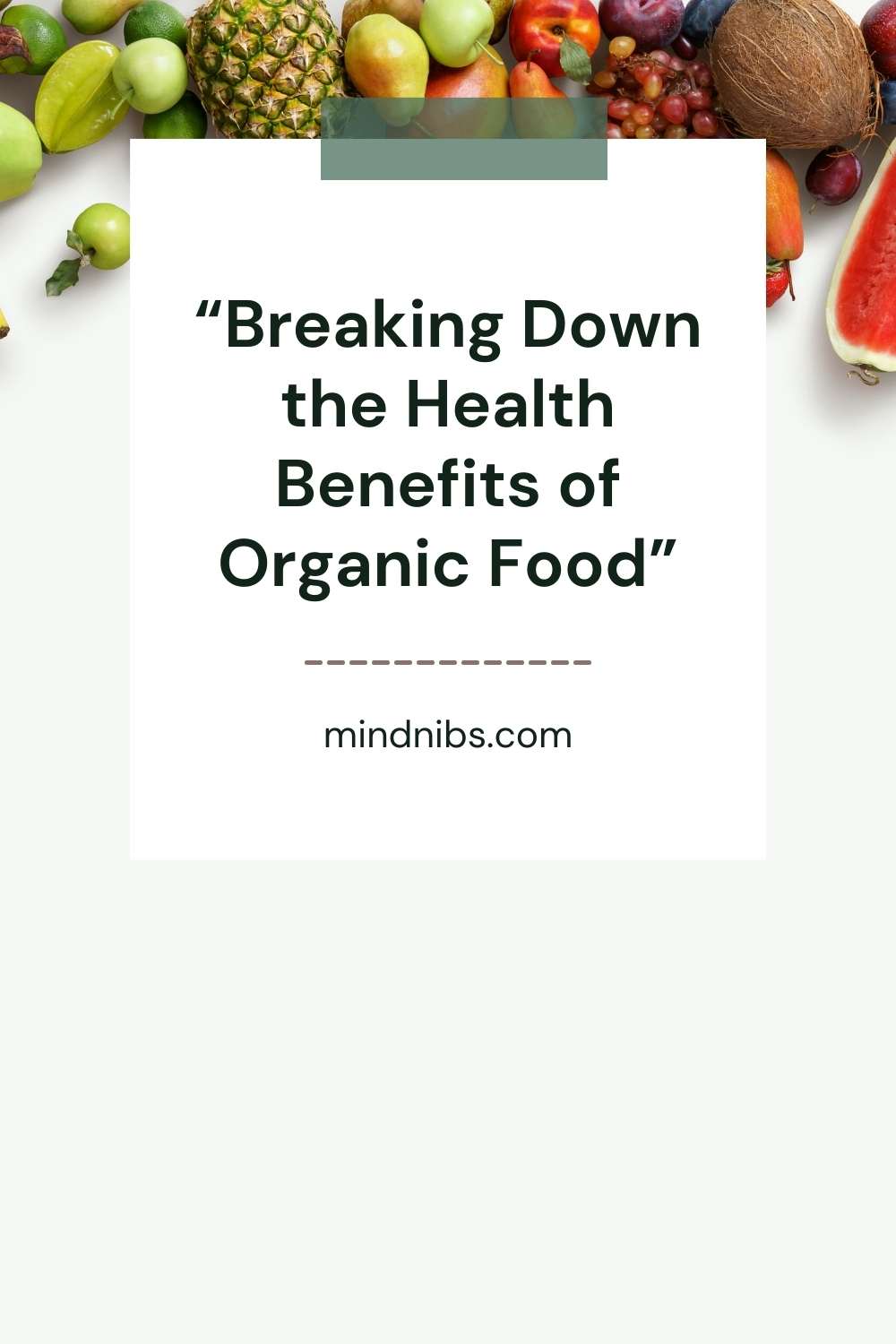
“Breaking Down the Health Benefits of Organic Food”
Organic food has become an increasingly popular choice among health-conscious consumers in recent years, with many people opting for these products over conventionally grown crops. But is it worth the extra expense? Are there really any significant health benefits to choosing organic products? In this article, we’ll explore the science behind organic food and break down the potential health benefits of consuming these products. From reducing exposure to harmful chemicals to providing more vitamins and nutrients, we may just convince you to make the switch to organic. So, let’s dive in and explore the health benefits of organic food.

1. Introduction to Organic Food: Understanding the Basics
Organic food is becoming increasingly popular, and more and more people are switching to it for a healthier lifestyle. In simple terms, organic food is grown and processed without the use of synthetic chemicals, hormones, antibiotics, or genetically modified organisms (GMOs). It is often fresher and more nutritious than conventionally grown food, and is also better for the environment.
One of the key principles of organic farming is the use of natural processes. This means that farmers rely on natural predators, such as ladybugs, to control pests instead of using chemical pesticides. They also use methods like crop rotation, intercropping, and composting to maintain soil fertility. These practices help to reduce the damage to soil, water, and ecosystems caused by conventional farming.
Choosing organic food is not only good for your health and the environment, but it can also support sustainable and ethical farming practices. By buying organic produce, you are supporting farmers who are working to preserve the health of the land and provide healthy food for their communities. Additionally, organic farming practices are often more labor-intensive, which leads to fairer working conditions for farm workers. So, the next time you’re at the grocery store, consider adding some organic fruits, vegetables, or meat to your cart.
2. The Benefits of Organic Food: A Comprehensive Guide
Organic food has gained popularity in recent years as people become more aware of the benefits it offers. In this comprehensive guide, we’ll explore the various benefits of consuming organic food and why it should be a part of your diet.
1. Health Benefits
- No Chemical Contamination: Organic food is produced without synthetic pesticides and fertilizers that can cause health issues such as cancers, neurological disorders, and birth defects.
- Nutrient-Rich: Without the use of chemicals, organic foods contain more nutrients and antioxidants in comparison to conventional produce.
- No GMOs: Genetically modified organisms (GMOs) are banned from use in organic farming, which is beneficial for individuals with environmental, ethical, and health concerns.
Overall, consuming organic food supports the prevention of chronic health problems, strengthens the immune system, and promotes overall well-being.
2. Environmental Benefits
- Less Environmental Pollution: Organic farming practices help minimize soil, water, and air pollution, which is better for the environment.
- Protection of Wildlife Habitat: Organic practices promote biodiversity, thus providing habitats for wildlife, insects, and microorganisms, which is essential in maintaining a healthy ecosystem.
- Reduced Carbon Footprint: Small, organic farms produce fewer emissions and require less energy than large-scale factory farming.
Embracing organic food consumption is not just beneficial to our health but also promotes sustainability practices and helps sustain our planet.
3. Nutritional Value: Why Organic Food is Better for Your Health
When it comes to deciding whether to purchase organic or conventional food, one of the most significant factors to consider is the nutritional value. While both types of food contain vitamins and minerals necessary for our health, the difference lies in the way they are grown, processed, and treated before reaching our plates.
Organic food is grown using non-synthetic pesticides and fertilizers, making it free of harmful chemicals. Organic farmers prioritize the quality of soil, which, in turn, results in nutrient-rich crops. Moreover, research shows that organic produce has higher levels of essential vitamins and minerals such as vitamin C, iron, magnesium, and phosphorus compared to their conventional counterparts.
Organic animal products, such as meat and dairy, provide more health benefits compared to conventional ones as they are not exposed to antibiotics or growth hormones. They are also pasture-raised, which means the animals are not confined to a small space and allowed to graze freely. As a result, organic animal products are richer in healthy fats like Omega-3 fatty acids, which are beneficial for heart health.
- In summary, choosing organic food can have numerous health benefits.
- Organic crops are grown in nutrient-rich soil and contain more essential minerals and vitamins.
- Organic animal products are not exposed to antibiotics or growth hormones, are pastured raised and thus contain higher levels of healthy fats.
Whether you are looking to improve your overall health or looking to reduce your exposure to harmful chemicals, choosing organic over conventional food is a step in the right direction. While the price of organic food may be higher, investing in your health by consuming nutrient-rich, chemical-free food is worth it.
4. Reduced Exposure to Harmful Chemicals: How Organic Food Promotes Well-being
Organic food has been shown to promote well-being by reducing exposure to harmful chemicals. Conventionally grown produce are often sprayed with pesticides and herbicides to ward off pests and weeds. However, these chemicals can be absorbed by the produce, putting consumers at risk of toxicity. Organic farming, on the other hand, uses natural methods such as crop rotation and companion planting to promote plant health and reduce the need for chemical interventions. This results in a lower concentration of harmful chemicals in organic produce, thus making it safer to consume.
- Organic food is free of synthetic pesticides and herbicides, which can cause a range of health problems such as cancer, neurological disorders, and reproductive issues.
- Organic farms use natural methods to control pests and weeds, such as crop rotation, companion planting, and natural predators. This reduces the amount of harmful chemicals in the environment and preserves the natural balance of the ecosystem.
- Organic livestock are raised without antibiotics, growth hormones, and other synthetic medications. This ensures that consumers are not exposed to harmful residues and antibiotic-resistant bacteria.
By choosing organic food, consumers can reduce their exposure to harmful chemicals and promote their overall well-being. The health benefits of consuming organic food include a reduced risk of cancer, lower levels of pesticide residues in the body, and improved nutritional value. Furthermore, supporting organic farming practices can help protect the environment, preserve biodiversity, and promote sustainable agriculture.
5. Better for the Environment: The Positive Impact of Organic Food on Our Ecosystem
Organic food is the healthier and more sustainable way to feed our bodies and the planet. Not only it benefits our health, but also contributes to the preservation and regeneration of our ecosystem. Here are some of the positive impacts of organic food on the environment.
1. Reduced pollution and soil erosion
Organic farming practices minimize the use of synthetic fertilizers, pesticides, and herbicides that harm the environment and kill beneficial insects and organisms. Instead, organic farmers rely on natural methods such as crop rotation, composting, and cover cropping to improve soil health, increase biodiversity and prevent erosion. This approach helps to reduce pollution and conserve water, which is increasingly becoming a scarce resource.
2. Supports wildlife conservation
Organic farming provides a habitat for wildlife by creating a diverse and natural ecosystem. Organic farmers avoid using toxic chemicals and genetically modified organisms, which can have harmful effects on the environment and compromise the delicate balance of ecosystems. By choosing organic products, we support the conservation of birds, bees, butterflies and other pollinators, which play a crucial role in the food chain and contribute to the diversity of our planet’s species.
3. Reduces carbon footprint
Organic farming practices rely on natural processes that sequester carbon in the soil and reduce carbon emissions from farm machinery and synthetic fertilizers production. By choosing organic products, we can reduce our carbon footprint and support sustainable agriculture. Additionally, organic farmers use renewable resources such as solar and wind power to minimize their impact on the environment and promote a circular economy.
In conclusion, choosing organic food is not only good for our health but also for the environment. Organic farming practices help to reduce pollution, conserve resources, support wildlife and promote sustainability. By making conscious decisions about the food we consume, we can contribute to a healthier ecosystem and leave a positive impact on the planet for future generations.
6. Organic Food and Disease Prevention: Lowering the Risk of Chronic Health Conditions
Eating organic food can lower the risk of developing chronic health conditions. Compared to conventional foods, organic food has several benefits. One of the primary benefits is that organic food is free from chemicals, pesticides, and fertilizers. These harmful substances that are present in conventional food can cause a variety of chronic health conditions, such as cancer, heart disease, and diabetes. By consuming organic food, you can reduce your exposure to these harmful substances, which, in turn, will reduce your risk of developing chronic health conditions.
Organic food is also rich in nutrients. Essential vitamins and minerals that are lacking in conventional food can be found in organic food. For example, organic fruits and vegetables have higher levels of vitamin C and antioxidants than conventional fruits and vegetables. These nutrients boost the immune system, helping to prevent chronic health conditions.
Finally, organic farming practices not only benefit the consumer but also the environment. Organic farming supports sustainability, reduces pollution, and conserves water. Buying organic food supports these farming practices, which in turn, positively contributes to the environment and society.
In conclusion, eating organic food is essential for lowering the risk of chronic health conditions. By consuming organic food, you are reducing your exposure to harmful chemicals and increasing your consumption of essential nutrients that can boost your immune system. Additionally, supporting organic farming practices has a positive impact on the environment and society as a whole. Invest in your health and the environment by choosing organic food whenever possible.
7. Making the Switch to Organic Food: How to Incorporate it into Your Diet and Lifestyle
Switching to organic food may seem like a daunting task, but it is a decision that can greatly benefit your health and the environment in the long run. Here are some tips on how you can incorporate organic food into your diet and lifestyle:
- Start small: Incorporate one or two organic items into your diet each week. You can begin with organic fruits and vegetables, which are readily available in most grocery stores. Gradually, you can switch to organic dairy products, meat, and eggs as you become more comfortable with the change.
- Read labels: Look for labels that indicate that the product is organic, such as the USDA organic seal. Avoid products with labels that say “natural,” “hormone-free,” or “antibiotic-free,” as they may not necessarily be organic.
- Find local organic farms: Check if there are any organic farms or farmer’s markets in your area. Not only will you be able to purchase fresh, organic produce, but you’ll also be supporting the local community.
Incorporating organic food into your diet also means adopting a more sustainable lifestyle. Here are some ways you can do so:
- Reduce food waste: Plan your meals in advance and only purchase what you need. If there are leftovers, freeze them for future use instead of throwing them away.
- Use reusable bags: Use cloth or mesh bags instead of plastic bags when shopping for groceries. This reduces waste and helps protect the environment.
- Compost: Composting your food waste creates a nutrient-rich fertilizer for your garden. This reduces waste and nourishes the soil.
Incorporating organic food into your diet and lifestyle requires a conscious effort, but it’s worth it. Not only will you be benefiting your health and the environment, but you’ll also be supporting sustainable farming practices. Start small, read labels, support local farms, and adopt sustainable habits to make the switch to organic food.
Organic food is healthier than non-organic food, and the benefits are undeniable. Organic food is fresher, more nutritious, and better for the environment. Though it may require a slightly larger initial investment, eating organic food is a smart choice for health-conscious consumers, and the long-term health benefits are too good to ignore.

























